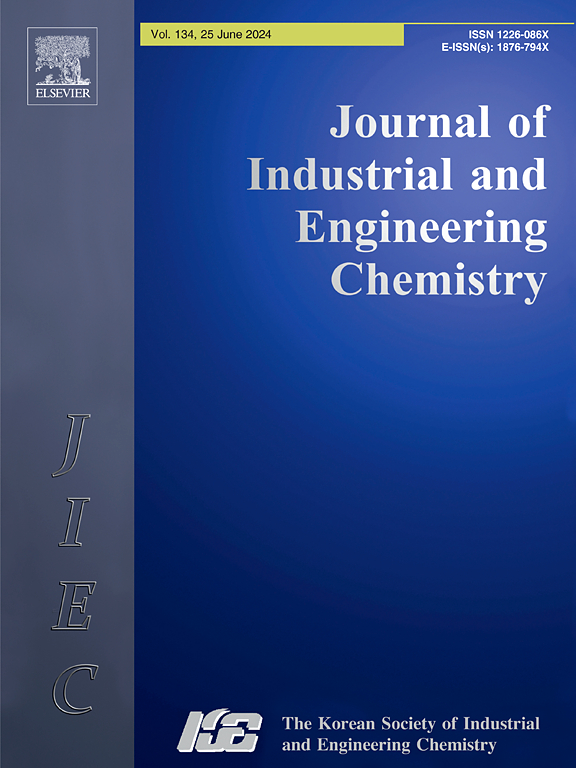Utilization of substrate specific membrane channels in liposome based biosensors: A nitrite biosensor with NirC nitrite channels
IF 5.9
3区 工程技术
Q1 CHEMISTRY, MULTIDISCIPLINARY
Journal of Industrial and Engineering Chemistry
Pub Date : 2024-10-09
DOI:10.1016/j.jiec.2024.09.056
引用次数: 0
Abstract
A liposome-based nitrite biosensor was prepared by encapsulating the nitrite reductase NirB enzyme and embedding the nitrite-specific NirC channels in the liposome structure. The proteoliposomes were coated on the glassy carbon electrode modified with the multi-walled carbon nanotube/chitosan matrix. The absence of channels in the liposome structure inhibits the generation of typical reduction peaks upon the addition of nitrite suggesting that ion channels are necessary for the passage of charged ions into the liposome. The response of the NirB and NirC incorporated liposome-based biosensor (CBLip/MWCNTs/CHIT/GC electrode) to the nitrite is shown to be fast and reproducible. The electrode shows a linear response between 1–500 µM nitrite concentrations. The sensitivity of the CBLip/MWCNTs/CHIT/GC electrode was 707 mA.M−1.cm−2, lower than that of the unentrapped NirB-loaded electrode (1131 mA.M−1.cm−2). While the electrode prepared with the unentrapped enzyme lost its activity in 30 days, entrapment of the enzyme in the liposome preserved the electrode activity by 55 %. The electrodes showed unexpected oxidation responses against high concentrations of sulfate and formate, the incorporation of NirC channels contributed to increasing the specificity of the electrode towards nitrite in the presence of these ions. The use of substrate-specific membrane channels in liposome-based biosensors was achieved for the first time in the present study.

求助全文
约1分钟内获得全文
求助全文
来源期刊
CiteScore
10.40
自引率
6.60%
发文量
639
审稿时长
29 days
期刊介绍:
Journal of Industrial and Engineering Chemistry is published monthly in English by the Korean Society of Industrial and Engineering Chemistry. JIEC brings together multidisciplinary interests in one journal and is to disseminate information on all aspects of research and development in industrial and engineering chemistry. Contributions in the form of research articles, short communications, notes and reviews are considered for publication. The editors welcome original contributions that have not been and are not to be published elsewhere. Instruction to authors and a manuscript submissions form are printed at the end of each issue. Bulk reprints of individual articles can be ordered. This publication is partially supported by Korea Research Foundation and the Korean Federation of Science and Technology Societies.

 求助内容:
求助内容: 应助结果提醒方式:
应助结果提醒方式:


